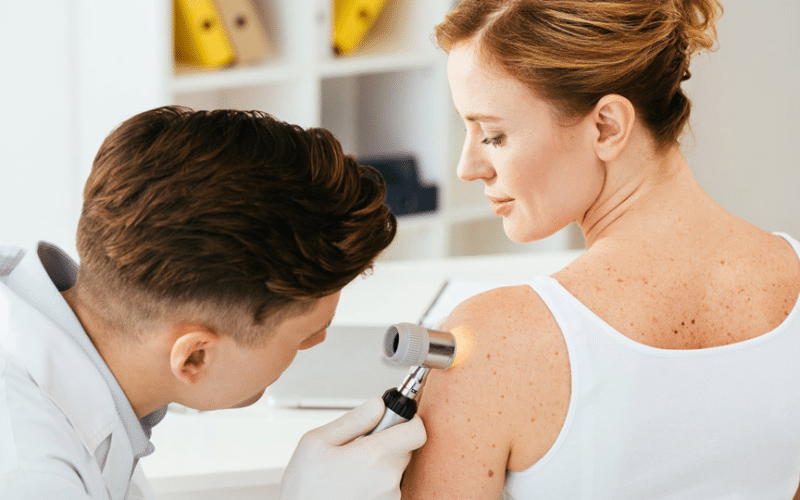Dry, itchy skin can be a bothersome and uncomfortable reality for many people. It can affect any part of the body and disrupt your daily life. But fear not! Finding the reasons behind your dry skin and seeking guidance from a dermatologist can lead you on the path to relief and a healthy, hydrated glow.
This blog will delve into the common reasons behind dry skin, offering insights into how to identify the triggers and what steps to take for effective treatment by a trusted medical dermatologist in Bloomington. We’ll also provide expert tips on maintaining your skin’s moisture, from recommended skincare routines to dietary adjustments. By the end of this blog, you’ll be equipped with the knowledge to tackle dry skin head-on and enjoy a smoother, more comfortable complexion.
What is Dry Skin?
Dry skin occurs when the skin’s natural barrier function is compromised, leading to a loss of moisture. This barrier, composed of oils and water, protects the skin from environmental irritants and assists it retain moisture. When this barrier weakens, the skin loses its ability to retain water, leading to dryness flaking, and irritation.
Causes of Dry Skin:
Numerous factors can contribute to dry skin, including:
Environmental Factors: Cold, dry weather, low humidity, and excessive hot water exposure can all strip the skin of its natural oils and moisture.
Skin Conditions like eczema and psoriasis cause dry, itchy skin.
Aging: As we age, our skin naturally produces less oil, increasing its susceptibility to dryness.
Medical Conditions: Some medical conditions, such as diabetes and thyroid problems, can also contribute to dry skin.
Medications: Certain medications, such as diuretics and retinoids, can have a drying effect on the skin.
Symptoms of Dry Skin:
The symptoms of dry skin varies on the severity of the condition. Here are some common signs:
Roughness and tightness
Flaking and scaling
Itching
Redness
Cracking
Increased sensitivity
Diagnosis of Dry Skin:
A medical dermatologist in Bloomington can usually diagnose dry skin through a simple physical examination. In few cases, additional tests may be necessary to rule out other underlying skin conditions such as eczema, psoriasis, or dermatitis. These tests might include skin biopsies, allergy tests, or blood work to identify any potential allergens or health issues contribute to your dry skin. Accurate diagnosis is crucial for the development of a treatment plan tailored specifically to your needs.
Treatment Options for Dry Skin:
The good thing is, dry skin is a treatable condition. Here are some treatment options a medical dermatologist might recommend:
Moisturizers: Moisturizers are the cornerstone of dry skin treatment. Look for thick, fragrance-free moisturizers containing ingredients like hyaluronic acid, ceramides, or petrolatum. Apply moisturizer regularly, especially after showering or bathing, while your skin is moist to seal in moisture.
Humectants: Humectants are substances that draw water into the skin. Common humectants include glycerin and hyaluronic acid.
Emollients: Emollients fill in the gaps between skin cells, smoothing rough patches and reducing the appearance of flakes. Oils like mineral oil and shea butter are common emollients.
Lifestyle adjustments can contribute to improve your skin’s hydration. Limit hot showers and baths; use lukewarm water instead. Opt for comfortable, loose-fitting clothing crafted from natural fibers such as cotton. Steer clear of harsh soaps & detergents that may strip your skin’s natural oils.
Prescription Medications: In some cases, your dermatologist might prescribe stronger topical medications or ointments to address severe dryness or inflammation.
Prevent Dry Skin:
Several steps can be taken to prevent dry skin:
Moisturize Regularly: Develop a consistent moisturizing routine, applying moisturizer to your face and body twice daily.
Take Lukewarm Showers and Baths: Limit hot showers and baths, opting for lukewarm water instead. Shorter showers are also better for your skin.
Pat Dry, Don’t Rub: After showering or bathing, pat your skin dry gently with a towel instead of rubbing.
Use a Humidifier: A humidifier can add moisture to the air, especially helpful in dry climates or during winter months.
Choose Gentle Skin Care Products: Opt for fragrance-free, gentle cleansers and skincare products that won’t irritate your skin.
Shield Your Skin from the Sun: Sun exposure can aggravate dry skin. Don’t forget to use sunscreen with an SPF of 30 or higher, even on cloudy days.
So, Dry skin is a common issue but it doesn’t have to control your life. By understanding the causes and symptoms and by seeking guidance from a medical dermatologist , you can plan a personalized treatment to achieve relief and maintain healthy, hydrated skin. With a little TLC (tender loving care) and expert advice, you can ditch the discomfort and say hello to a radiant, healthy glow.
FAQs
- What’s the difference between a moisturizer and a humectant?
Both are crucial for dry skin, but they work differently. Moisturizers trap existing moisture in the skin, while humectants attract water from the air to the skin. Look for moisturizers containing humectants like hyaluronic acid for a double whammy of hydration.
- Can showering too often worsen dry skin?
Yes, hot showers and frequent bathing can strip your skin of its natural oils. Limit showers or baths to lukewarm water and keep them brief. Gently pat your skin dry instead of rubbing it.
- Are there any foods that can help with dry skin?
While no single food can cure dry skin, a proper diet rich in omega-3 fatty acids, fruits, and veggies contribute to overall skin health. Staying hydrated is also essential to maintain skin moisture.
- What are some natural ways to relieve dry skin?
Coconut oil, shea butter, and oatmeal baths provide temporary relief for dry skin. However, if your symptoms are severe or persistent, it’s important to consult a dermatologist. They can help rule out any underlying conditions and create a personalized treatment plan for lasting relief.
- How long does it take to see results from treating dry skin?
With consistent use of moisturizers and lifestyle changes, you might notice improvement in a week or two. However, for severe dryness or underlying skin conditions, a dermatologist’s guidance and prescription medications might be necessary for long-term relief.

